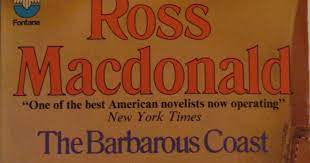The Barbarous Coast (1956) by Ross Macdonald
Goodreads meta-data is 240 pages rated 3.86 by 1,196 litizens.
Genre: PI.
Lew Archer agrees to find a run-away wife so that her husband can talk to her. He seems harmless; she isn’t. It is sixth entry in Macdonald’s sunshine noir oeuvre, featuring Lew.

The wife has latched onto a film contract, or to be more exact, a film mogul has latched onto her with the contract bait. Who will land whom? Who is the more unscrupulous and devious? It’s neck-and-neck on those criteria. The backdrop of Archer’s weary and gruelling investigation is So Cal Babylon:
“Hollywood started as a meaningless dream, invented for money. But its colors ran, out through the holes in people’s heads, spread across the landscape, and solidified: North and south along the coast, east across the desert, across the continent. Now we were stuck with the dream without a meaning. It has become the nightmare that we lived in.” He is reacting to the people from across the country who come to Hollywood to live in that dream, and fail.
The dream went sour but we are stuck with it. ‘Huh?’ you may well say, but it is striking prose all the same. The Studios will do anything – yes, anything, including eating their own – to preserve the dream because that is where the money is. The title should refer to cannibalism.
As always with Macdonald few words are wasted. When furniture in a room is described it adds weight to the ambience, if the colour of a car is noted it reflects the mood, if a man’s suit is mentioned the bulge in his coat conceals a gun, and so on. There are no Vogue-Elle-IKEA descriptions as ends-in-themselves. Then there are the metaphors that sharpen the spikes. Macdonald is surely the inheritor of Chandler. The vision is bleak in all that sunshine, in all that post war wealth, in all that easy living, but somehow uplifting in the end when all the pieces fall into place and the decent people get on with their lives. There is no happy ending but there is resolution of a kind.
Spoiler: His standard plot devices are present. The villain, well the first villain since there are many, hired Archer as cover, there is a folie à deux in a middle-aged couple who ought to know better, there are unscrupulous fixers, crooked cops, wannabe starlets, honest working stiffs, innocent victims, sunshine grifters, musclemen, bathing beauties, in short, much of fictional So Cal.
Those connoisseurs who chart these things regard it as the last book in the first phase of Archer’s three-part career. Good as it is, the Archer books got better and better, it is true, and I thought there were times in these pages when Macdonald was trying too hard, or I simply missed the point, or a tangent contributed nothing. For a tribute to Macdonald’s career click the embedded link below.
https://www.januarymagazine.com/crfiction/rossintro.html
Snowflake alert: the book reflects the time and place in this portrayal of blacks, hispanics, women, homosexuals though none of this is emphasised. That said, the only honest people Archer encounters are a black pool man, a Latino gateman, and the wife’s sister, all of whom are crucial to the plot.

